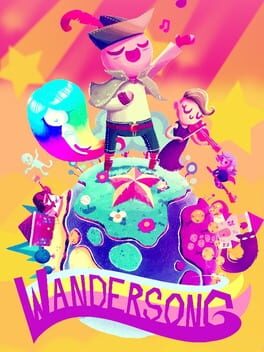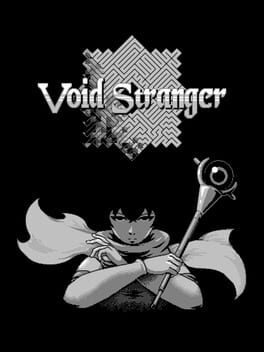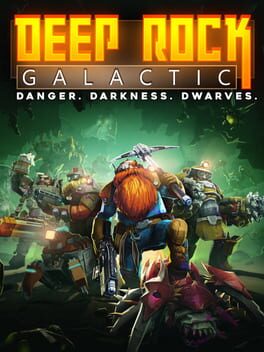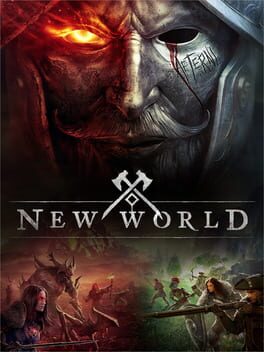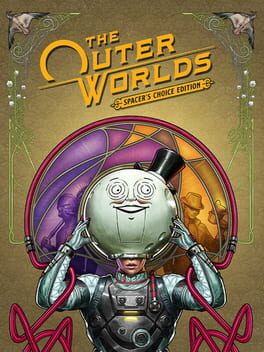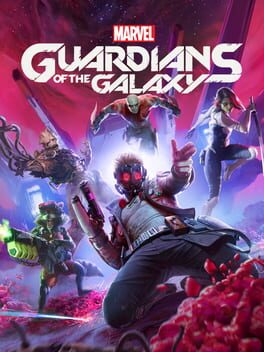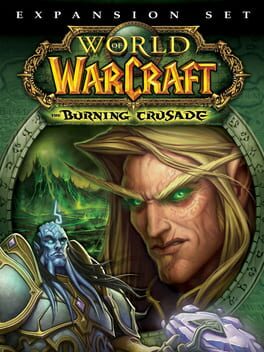Klaustrix
BACKER
122 Reviews liked by Klaustrix
Wandersong
2018
Wandersong
2018
This review contains spoilers
So, a few days ago, I wrote about how Okami was extremely special to me because it really left a mark upon me from how earnest and uplifting the whole experience felt, and to this day, nothing has exceeded that. Well, there was one game that came very close in its own way, and that one game was Wandersong. This is going to be one of the tougher reviews I write, mainly because while I've already spoiler tagged, I don't want to give away too many spoilers and ruin the many surprises I experienced while going through this myself a few years back. So sit back and relax while I reminisce a bit about Wandersong, and hopefully by the end of this I can convince you that this is one title you're just going to have to see for yourself.
A bit of background here: I played Wandersong on a whim from a friend's suggestion in the middle of 2020. I don't think I have to exaggerate how shit of a year 2020 was for everyone, but needless to say I was not excluded from this; that year involved events such as my own internal struggles with finishing my masters degree requirements, my dad suddenly facing early retirement, and my grandma becoming bedridden until one day, she wasn't there anymore (and I will always regret not being there with last words unspoken because of the pandemic). So I was definitely looking for catharsis in some form, and I turned to the same medium that had always lent a comforting hand; I wasn't expecting Okami levels of greatness (or really anything even close to that) but hey, this cutesy looking puzzle platforming game should do the trick and I'll just play it, feel good for a day with little lasting appeal past that, and move on with my life. That's all there is to it, right?
Oh man, I was so wrong.
Wandersong doesn't pull its punches. From the start of the game, you are immediately forced to confront the harsh reality that you are in fact, not the hero. The messenger of the goddess gives you this cursory scan, tells you to pick up a hero's sword, and deems you unworthy of carrying out the true prophecy. And you wake up in your cabin in the meadows, wondering if this was all a dream.
And for a little bit, it seems like it was. You go about your day, stumble into town, and all of a sudden... there are ghosties in town haunting everyone? And it's up to us to sing our way through this issue and find a way to dispel these foul spirits! But as cartoony as Wandersong is, there's this touch of realism that keeps you grounded. Turns out, you later learn that this is all one giant omen; chaos is sprouting everywhere as people continue about their day, unaware or perhaps unwilling to confront their own demise. And it's up to us, a side character and most definitely not the hero of the story, to collect all the pieces of the Earthsong to try and find a way out of this through the power of music bringing the whole world together!
But as you go along, you'll constantly be reminded that you are indeed and very much so, not the main protagonist. You're just a bard with no super powers or super abilities (except for some damn resilient vocal cords I suppose), and meanwhile this slick and composed girl with a giant ass sword is the true hero of this tale and will bring everyone to salvation! And you, as a hapless side character, are destined to run into obstacle after obstacle of other characters and other conflicts getting in the way. You can't solve them with sheer strength or sheer will; you'll need to figure out different solutions (and there are some very clever mechanics and tinkerings with the song controller mechanics I will not go into because you need to experience that yourself) to get over these barriers even as all the odds are against you. This indifferent world will continue spinning while the fabric of reality comes apart at the seams, and the powers that be... simply don't give a damn.
I think that's one of the major draws that Wandersong has over Okami; there's really no "bad guy" at the end of all this. Everyone is sympathetic and faces their own struggles at the end of the day, and no one exists simply as a plot device or a comic book villain designed to be a final boss. You'll find that while they may be an obstacle to clear, everyone and everything in this story exists as a character with their own tale to tell, and I cannot stress how impressive this is in a game where you form connections with so many individuals across this vast world.
I'll also point out that while Wandersong is not afraid to go for the deep cuts and get very melancholy and existential, it approaches all of its subjects with a careful touch. There's a ton of humor to be found in this game; again, I won't spoil these moments for you, but I found myself bursting out in laughter many many times as our hapless side character stumbles his way through this crazy world with little concrete planning of how to accomplish this fabled task of saving the universe. He's most definitely not perfect and neither are anyone around him, and these interactions are both humanizing and heartwarming while keeping in mind the bigger picture of what holds us together as humans while never forgetting what drives us apart.
And then you get to meet the hero herself. She's so badass with this lightning sword and flowy scarf and strong confident gaze and goes slashy slashy real quick! But then the two of you get trapped in a cave with no sense of direction and... she's lost. She's helpless. She was so sure that she was better than you in every way imaginable... after all, the messenger of the goddess gave her this big ass sword that spews lightning and she was prophesied as the hero of the story and you're just this singing boy with a woodsy hat, how similar could you two really be? And the two of you just... ruminate for a while, talking about life, chasing meaning, why we're even here, what's even the point of all this, and so on so forth. And something broke inside me. In that empty year where nothing happened for so long yet so much happened in a while, I suppose I never took the time to process everything around me despite somehow finding myself with so much time on my hands, and never really accomplishing any of it.
But life goes on, and so must our (not) hero's story. We find ourselves at the world's end. Despite all our efforts, things fall apart, and the center cannot hold. The maw of the void looms ever closer, and every waking moment feels like we're about to be swallowed by the abyss. The final battle is lost, and... that's it. Game over.
...and somewhere in the darkness, there is a light that we cannot see, and there remains hope.
I'm keeping my descriptions deliberately vague because going into more detail than that would ruin this whole adventure for anyone coming into it. But needless to say, the whole game really comes together at the end. I didn't know that I needed this, and I didn't expect to remember anything coming out of this. But Wandersong is just one of those games I will never forget. Every corner of the game oozes creativity and care. Comfort and depth. Humor and mirth. You may not matter to this great big world when this whole story's said and done, but somewhere out there, you matter to someone. And that's all that it takes.
You can finish Wandersong in one day, and you won't want to put it down. I didn't even feel the need to discuss the intuitive and meaningful song controller mechanics, or the Paper Mario art style, or the gorgeous soundtrack, because Wandersong is all of these and yet at its core, is so much more. I kept getting this feeling that this game is so much better than it deserved to be, and now I think that few games, if any, deserve to be as good as Wandersong.
Thanks for reading this. Please play Wandersong. You won't regret it.
A bit of background here: I played Wandersong on a whim from a friend's suggestion in the middle of 2020. I don't think I have to exaggerate how shit of a year 2020 was for everyone, but needless to say I was not excluded from this; that year involved events such as my own internal struggles with finishing my masters degree requirements, my dad suddenly facing early retirement, and my grandma becoming bedridden until one day, she wasn't there anymore (and I will always regret not being there with last words unspoken because of the pandemic). So I was definitely looking for catharsis in some form, and I turned to the same medium that had always lent a comforting hand; I wasn't expecting Okami levels of greatness (or really anything even close to that) but hey, this cutesy looking puzzle platforming game should do the trick and I'll just play it, feel good for a day with little lasting appeal past that, and move on with my life. That's all there is to it, right?
Oh man, I was so wrong.
Wandersong doesn't pull its punches. From the start of the game, you are immediately forced to confront the harsh reality that you are in fact, not the hero. The messenger of the goddess gives you this cursory scan, tells you to pick up a hero's sword, and deems you unworthy of carrying out the true prophecy. And you wake up in your cabin in the meadows, wondering if this was all a dream.
And for a little bit, it seems like it was. You go about your day, stumble into town, and all of a sudden... there are ghosties in town haunting everyone? And it's up to us to sing our way through this issue and find a way to dispel these foul spirits! But as cartoony as Wandersong is, there's this touch of realism that keeps you grounded. Turns out, you later learn that this is all one giant omen; chaos is sprouting everywhere as people continue about their day, unaware or perhaps unwilling to confront their own demise. And it's up to us, a side character and most definitely not the hero of the story, to collect all the pieces of the Earthsong to try and find a way out of this through the power of music bringing the whole world together!
But as you go along, you'll constantly be reminded that you are indeed and very much so, not the main protagonist. You're just a bard with no super powers or super abilities (except for some damn resilient vocal cords I suppose), and meanwhile this slick and composed girl with a giant ass sword is the true hero of this tale and will bring everyone to salvation! And you, as a hapless side character, are destined to run into obstacle after obstacle of other characters and other conflicts getting in the way. You can't solve them with sheer strength or sheer will; you'll need to figure out different solutions (and there are some very clever mechanics and tinkerings with the song controller mechanics I will not go into because you need to experience that yourself) to get over these barriers even as all the odds are against you. This indifferent world will continue spinning while the fabric of reality comes apart at the seams, and the powers that be... simply don't give a damn.
I think that's one of the major draws that Wandersong has over Okami; there's really no "bad guy" at the end of all this. Everyone is sympathetic and faces their own struggles at the end of the day, and no one exists simply as a plot device or a comic book villain designed to be a final boss. You'll find that while they may be an obstacle to clear, everyone and everything in this story exists as a character with their own tale to tell, and I cannot stress how impressive this is in a game where you form connections with so many individuals across this vast world.
I'll also point out that while Wandersong is not afraid to go for the deep cuts and get very melancholy and existential, it approaches all of its subjects with a careful touch. There's a ton of humor to be found in this game; again, I won't spoil these moments for you, but I found myself bursting out in laughter many many times as our hapless side character stumbles his way through this crazy world with little concrete planning of how to accomplish this fabled task of saving the universe. He's most definitely not perfect and neither are anyone around him, and these interactions are both humanizing and heartwarming while keeping in mind the bigger picture of what holds us together as humans while never forgetting what drives us apart.
And then you get to meet the hero herself. She's so badass with this lightning sword and flowy scarf and strong confident gaze and goes slashy slashy real quick! But then the two of you get trapped in a cave with no sense of direction and... she's lost. She's helpless. She was so sure that she was better than you in every way imaginable... after all, the messenger of the goddess gave her this big ass sword that spews lightning and she was prophesied as the hero of the story and you're just this singing boy with a woodsy hat, how similar could you two really be? And the two of you just... ruminate for a while, talking about life, chasing meaning, why we're even here, what's even the point of all this, and so on so forth. And something broke inside me. In that empty year where nothing happened for so long yet so much happened in a while, I suppose I never took the time to process everything around me despite somehow finding myself with so much time on my hands, and never really accomplishing any of it.
But life goes on, and so must our (not) hero's story. We find ourselves at the world's end. Despite all our efforts, things fall apart, and the center cannot hold. The maw of the void looms ever closer, and every waking moment feels like we're about to be swallowed by the abyss. The final battle is lost, and... that's it. Game over.
...and somewhere in the darkness, there is a light that we cannot see, and there remains hope.
I'm keeping my descriptions deliberately vague because going into more detail than that would ruin this whole adventure for anyone coming into it. But needless to say, the whole game really comes together at the end. I didn't know that I needed this, and I didn't expect to remember anything coming out of this. But Wandersong is just one of those games I will never forget. Every corner of the game oozes creativity and care. Comfort and depth. Humor and mirth. You may not matter to this great big world when this whole story's said and done, but somewhere out there, you matter to someone. And that's all that it takes.
You can finish Wandersong in one day, and you won't want to put it down. I didn't even feel the need to discuss the intuitive and meaningful song controller mechanics, or the Paper Mario art style, or the gorgeous soundtrack, because Wandersong is all of these and yet at its core, is so much more. I kept getting this feeling that this game is so much better than it deserved to be, and now I think that few games, if any, deserve to be as good as Wandersong.
Thanks for reading this. Please play Wandersong. You won't regret it.
Void Stranger
2023
Skipping the tedious puzzles with a guide is really the only way to enjoy this game. The interesting parts of this game get buried under piles of monotonous movement calculations that completely take you out of the experience. I really, REALLY wish the game was even just a little fun to play, as the storytelling here is absolutely phenomenal, and an actual game backing it up would elevate the experience to another level rather than just being mind-numbing.
Deep Rock Galactic
2020
Lumines Remastered
2018
Journey
2012
At this point, I feel like I’ve been playing Journey for half of my life. I’ve played through underwater Journey, forest Journey, air Journey, space Journey, cat Journey, and even boring Journey. Yet upon my yearly ascent in the original Journey on New Year’s Day, I find myself just as floored as when I first picked it up years ago, in spite of clone after clone exhausting my goodwill. What exactly then, is present in the original’s realized game design philosophy that every other spiritual successor has found themselves bereft of?
To answer this question, I want you to imagine a world where Journey doesn’t exist. A world where the formula to indie developers meant something more than just mindlessly tilting up on the left joystick to walk towards the next checkpoint while some narrator waxed poetic in the background. Before Journey, before Flower even, the closest ancestor we had was Ico. Fumito Ueda described his game as an execution of “boy meets girl,” and what it boiled down to was a minimalist adventure game with some puzzles cleverly disguised as platforming and timing segments. Occasionally, you also whack a few shadows while protecting and pulling your female companion Yorda through vast and still castle ruins. It wasn’t a perfect game by any means; the combat was frankly tedious, Yorda lacked much of an identity outside of pointing at objects of interest/opening doors/getting kidnapped, and at the end of the day, there really wasn’t much in the way of a balanced and developed relationship when the player was calling all the shots, but it was still the start of something beautiful. It wasn’t mechanically complex or esoteric in any fashion, but it was different. It was different, and it felt dangerous.
This write-up is not intended to be a critique of Ico, nor is it meant to imply that games proceeding Team Ico's philosophy of “design by subtraction” have since been inferior. Rather, I bring up Ico in particular, because there seems to be this general perception that minimalism results in a crippling lack of mechanical depth. That is, many seem to believe that discarding and minimizing a game’s various elements results in a dearth of tangible mechanics or imagery to cling onto, and thus appears to result in an empty and vacuous experience with little to justify further replays or deeper dives. To me though, this line of thought fundamentally misunderstands the purpose of addition by subtraction. It was never about creating mechanically deep systems with limitless possibilities like an immersive sim or a sandbox. Rather, the philosophy aimed to remove excess layers that distracted from the game’s “more realistic feeling of presence”, such as removing optional bosses and landmarks in Shadow of the Colossus or reducing enemy types in Ico to just a single design. In fairness, the goal wasn't just to remove extraneous elements that made something feel overly “gamey,” but also to marry mechanics in a way where the invisible layer of intended design never made itself too apparent (i.e. hiding the user interface in Shadow of the Colossus outside of fights). It was not just addition by subtraction; it was also addition through illusion.
To that end, I firmly believe that Journey is the best Team Ico game that Fumito Ueda never directed. Journey’s design philosophy was not necessarily revolutionary for its time, considering its predecessors in the forms of Flower and Ico, nor was its ultimate goal of reaching a final destination via walking/jumping/flying mechanics particularly exemplary. What was exemplary was its level of care and precision in how it implemented said minimalist design philosophy. Every time I play through Journey, I pick up more subtle details through its fusion of audio-visual presentation and gameplay that seemed so clear and intuitive that I had taken their presence for granted. There are the obvious strengths, like how Journey wordlessly conveys your path forward by keeping the shining peak of the mountain visible at all times while outside, or how it uses consistent visual language through cloth creatures and strips to demarcate safe zones where the player can recharge their scarf. But there’s more beneath the surface; what about the game's sneaky introduction to the sand-sliding mechanic from the introductory dune so it’s no longer unfamiliar during the exhilarating and committal descent, or how there’s a section of the underground that’s filled with these scarf jellyfish tinted in blue allowing you to remain in flight that evokes the feeling of being underwater, foreshadowing the next section as a tower ascension where the player must continually breach the surface to “swim” and escape? Sure, everyone knows about how the bitter cold disempowers the player by slowing their movement and lowering the scarf’s energy gauge, but I usually don’t hear about how strong winds can chip away at the scarf’s capacity itself or how it reduces the volume and area of effect of your shouts, making it far more difficult to restore your energy gauge from the growing frostbite.
There’s also the overlooked audio aspect of Journey. Granted, everyone loves to discuss the soundtrack’s thematics, like how the final chord of Journey’s motif never resolves a single time in any track until the end of Apotheosis or for that matter, how all the instruments are never fully present until that final ascent, when the entire orchestra finally comes together as one only to slowly fall away as the player and the world fade away. Yet, the sound design regarding Journey’s implementation of said soundtrack often goes underappreciated. Again, there are plenty of clear strengths that have been widely discussed, such as the punctuated stillness of the desert dunes providing room for the piddle paddle of the player’s footsteps amongst the vast desert winds and eventually swelling into triumphant bursts of adventure. But again, there are little subtleties that speak to the soundtrack’s interactivity, like how the backing drum during the aforementioned underwater section gives the track the impression of being muted and seamlessly drops this filter once the player breaches the surface, or how the player’s shouts are always in the key of the backing track’s scale, meaning that the introduced notes remain within the game’s tonality. It’s these little things that further round out Journey’s experience; the music is so seamlessly woven in that it takes a discerning ear to pick out every specific detail, in such a way where it feels like the soundtrack is organically supplementing every memorable moment of the game.
Of course, it’s not enough to just handle the basics well, even if there’s a master’s touch present to carefully disguise these additions so silently. As I mentioned before, popular works need compelling hooks to draw in an audience, but they also need an element of danger to keep that audience engaged. In the case of Journey, Thatgamecompany tackles this through their stealth multiplayer. This is where Journey easily outclasses its successors and may in fact, even have one-upped Ico. If Ico’s main limitation was a lack of autonomy for any non-player characters, then Journey circumvents this problem entirely by replacing the AI with real players instead. The loose implementation adds a catch: nothing in the game aside from the final completion screen listing your companion(s)’ name(s) ever hints on this, and not once is the player given instructions or suggestions on how to interact with said players. The only obvious mechanical incentive from cooperating with other players is the ability to recharge one another’s scarves via proximity/shouts, and there’s no consequence to merely abandoning random players or quitting in the middle of a session. It’s what makes this multiplayer so compelling; many times you’ll find other players just wandering about by themselves, despawning, or quickly rushing ahead without care towards your presence. There’s no guarantee that they’ll cooperate… which makes that one instance where they do that much more memorable. In this sense, I think Jenova Chen and his team solved two problems at once: the aforementioned challenge of granting outside elements a degree of realism, and his own personal challenge of creating a minimalist environment where players had no incentives to act in bad faith despite never having any major incentives to cooperate either, resulting in seemingly organic interactions.
Perhaps it is cheating to state that this spontaneous element is what gives Journey a step-up over its peers, but I also can’t deny that this same feature is exactly what lends the game its identity. It’s hard to provide drastically different experiences for focused single player games after all; no matter how much Fumito Ueda may have insisted that he was inspired by emergent gameplay mechanics and player autonomy to allow for more diverse experiences, there remains an upper limit upon how far those experiences can unravel. However, Thatgamecompany’s take upon the “single-player odyssey” alongside the game’s cyclical nature and short runtime means that Journey is a far more replayable experience while remaining every bit as compelling as its competition. Even after multiple trips up the summit, I continue to be amazed by the thoughtfulness shown to me by other players. I can’t tell you how many times I’ve fallen down the temple from being blown away by the wind, only for my companion to jump down with me, or how many trips through the blizzard were spent slowly trudging together mashing my shout, just like strangers on a cold winter’s night huddling together for warmth while shouting cries of encouragement to take one more step forward. In essence, Journey didn't need an intricate or elaborate story told with fanciful cutscenes and voice-acting; it simply needed to provide a backbone with no other contradicting elements, allowing players to form their own stories by experiencing the game on their own terms.
Journey isn’t mechanically rich or wildly innovative in terms of its scope, but it doesn’t have to be. Rather, it’s a deceptively simple yet meticulous and thoughtfully different approach upon a respected design philosophy, which aimed to further refine said formula by whittling down any elements that detracted from the game’s constructed sense of reality. Similarly, it doesn't feel the need to present a grandiose narrative, instead stripping away any specific contextual layers as to allow players to create memorable experiences with no conflicting moments in-between. I should be sick of this formula after tackling so many misguided copycats, and I can't deny that I was afraid to label yet another old favorite as propped up by nostalgia. Thankfully, my fears have been assuaged. I keep waiting for the day where I’ll finally be content putting this down forever… but that day has yet to come. I was not the first adventurer to embark upon this pilgrimage, nor will I be the last. Maybe I just need to get over my cynicism and accept that there was never anything to be cynical of to begin with. I’m sure more developers will continue to lazily carbon copy one of my favorites until the end of time, but that doesn’t mean the good times have to end.
Thanks for reading, everyone. Happy new year, and here’s to another journey around the sun.
To answer this question, I want you to imagine a world where Journey doesn’t exist. A world where the formula to indie developers meant something more than just mindlessly tilting up on the left joystick to walk towards the next checkpoint while some narrator waxed poetic in the background. Before Journey, before Flower even, the closest ancestor we had was Ico. Fumito Ueda described his game as an execution of “boy meets girl,” and what it boiled down to was a minimalist adventure game with some puzzles cleverly disguised as platforming and timing segments. Occasionally, you also whack a few shadows while protecting and pulling your female companion Yorda through vast and still castle ruins. It wasn’t a perfect game by any means; the combat was frankly tedious, Yorda lacked much of an identity outside of pointing at objects of interest/opening doors/getting kidnapped, and at the end of the day, there really wasn’t much in the way of a balanced and developed relationship when the player was calling all the shots, but it was still the start of something beautiful. It wasn’t mechanically complex or esoteric in any fashion, but it was different. It was different, and it felt dangerous.
This write-up is not intended to be a critique of Ico, nor is it meant to imply that games proceeding Team Ico's philosophy of “design by subtraction” have since been inferior. Rather, I bring up Ico in particular, because there seems to be this general perception that minimalism results in a crippling lack of mechanical depth. That is, many seem to believe that discarding and minimizing a game’s various elements results in a dearth of tangible mechanics or imagery to cling onto, and thus appears to result in an empty and vacuous experience with little to justify further replays or deeper dives. To me though, this line of thought fundamentally misunderstands the purpose of addition by subtraction. It was never about creating mechanically deep systems with limitless possibilities like an immersive sim or a sandbox. Rather, the philosophy aimed to remove excess layers that distracted from the game’s “more realistic feeling of presence”, such as removing optional bosses and landmarks in Shadow of the Colossus or reducing enemy types in Ico to just a single design. In fairness, the goal wasn't just to remove extraneous elements that made something feel overly “gamey,” but also to marry mechanics in a way where the invisible layer of intended design never made itself too apparent (i.e. hiding the user interface in Shadow of the Colossus outside of fights). It was not just addition by subtraction; it was also addition through illusion.
To that end, I firmly believe that Journey is the best Team Ico game that Fumito Ueda never directed. Journey’s design philosophy was not necessarily revolutionary for its time, considering its predecessors in the forms of Flower and Ico, nor was its ultimate goal of reaching a final destination via walking/jumping/flying mechanics particularly exemplary. What was exemplary was its level of care and precision in how it implemented said minimalist design philosophy. Every time I play through Journey, I pick up more subtle details through its fusion of audio-visual presentation and gameplay that seemed so clear and intuitive that I had taken their presence for granted. There are the obvious strengths, like how Journey wordlessly conveys your path forward by keeping the shining peak of the mountain visible at all times while outside, or how it uses consistent visual language through cloth creatures and strips to demarcate safe zones where the player can recharge their scarf. But there’s more beneath the surface; what about the game's sneaky introduction to the sand-sliding mechanic from the introductory dune so it’s no longer unfamiliar during the exhilarating and committal descent, or how there’s a section of the underground that’s filled with these scarf jellyfish tinted in blue allowing you to remain in flight that evokes the feeling of being underwater, foreshadowing the next section as a tower ascension where the player must continually breach the surface to “swim” and escape? Sure, everyone knows about how the bitter cold disempowers the player by slowing their movement and lowering the scarf’s energy gauge, but I usually don’t hear about how strong winds can chip away at the scarf’s capacity itself or how it reduces the volume and area of effect of your shouts, making it far more difficult to restore your energy gauge from the growing frostbite.
There’s also the overlooked audio aspect of Journey. Granted, everyone loves to discuss the soundtrack’s thematics, like how the final chord of Journey’s motif never resolves a single time in any track until the end of Apotheosis or for that matter, how all the instruments are never fully present until that final ascent, when the entire orchestra finally comes together as one only to slowly fall away as the player and the world fade away. Yet, the sound design regarding Journey’s implementation of said soundtrack often goes underappreciated. Again, there are plenty of clear strengths that have been widely discussed, such as the punctuated stillness of the desert dunes providing room for the piddle paddle of the player’s footsteps amongst the vast desert winds and eventually swelling into triumphant bursts of adventure. But again, there are little subtleties that speak to the soundtrack’s interactivity, like how the backing drum during the aforementioned underwater section gives the track the impression of being muted and seamlessly drops this filter once the player breaches the surface, or how the player’s shouts are always in the key of the backing track’s scale, meaning that the introduced notes remain within the game’s tonality. It’s these little things that further round out Journey’s experience; the music is so seamlessly woven in that it takes a discerning ear to pick out every specific detail, in such a way where it feels like the soundtrack is organically supplementing every memorable moment of the game.
Of course, it’s not enough to just handle the basics well, even if there’s a master’s touch present to carefully disguise these additions so silently. As I mentioned before, popular works need compelling hooks to draw in an audience, but they also need an element of danger to keep that audience engaged. In the case of Journey, Thatgamecompany tackles this through their stealth multiplayer. This is where Journey easily outclasses its successors and may in fact, even have one-upped Ico. If Ico’s main limitation was a lack of autonomy for any non-player characters, then Journey circumvents this problem entirely by replacing the AI with real players instead. The loose implementation adds a catch: nothing in the game aside from the final completion screen listing your companion(s)’ name(s) ever hints on this, and not once is the player given instructions or suggestions on how to interact with said players. The only obvious mechanical incentive from cooperating with other players is the ability to recharge one another’s scarves via proximity/shouts, and there’s no consequence to merely abandoning random players or quitting in the middle of a session. It’s what makes this multiplayer so compelling; many times you’ll find other players just wandering about by themselves, despawning, or quickly rushing ahead without care towards your presence. There’s no guarantee that they’ll cooperate… which makes that one instance where they do that much more memorable. In this sense, I think Jenova Chen and his team solved two problems at once: the aforementioned challenge of granting outside elements a degree of realism, and his own personal challenge of creating a minimalist environment where players had no incentives to act in bad faith despite never having any major incentives to cooperate either, resulting in seemingly organic interactions.
Perhaps it is cheating to state that this spontaneous element is what gives Journey a step-up over its peers, but I also can’t deny that this same feature is exactly what lends the game its identity. It’s hard to provide drastically different experiences for focused single player games after all; no matter how much Fumito Ueda may have insisted that he was inspired by emergent gameplay mechanics and player autonomy to allow for more diverse experiences, there remains an upper limit upon how far those experiences can unravel. However, Thatgamecompany’s take upon the “single-player odyssey” alongside the game’s cyclical nature and short runtime means that Journey is a far more replayable experience while remaining every bit as compelling as its competition. Even after multiple trips up the summit, I continue to be amazed by the thoughtfulness shown to me by other players. I can’t tell you how many times I’ve fallen down the temple from being blown away by the wind, only for my companion to jump down with me, or how many trips through the blizzard were spent slowly trudging together mashing my shout, just like strangers on a cold winter’s night huddling together for warmth while shouting cries of encouragement to take one more step forward. In essence, Journey didn't need an intricate or elaborate story told with fanciful cutscenes and voice-acting; it simply needed to provide a backbone with no other contradicting elements, allowing players to form their own stories by experiencing the game on their own terms.
Journey isn’t mechanically rich or wildly innovative in terms of its scope, but it doesn’t have to be. Rather, it’s a deceptively simple yet meticulous and thoughtfully different approach upon a respected design philosophy, which aimed to further refine said formula by whittling down any elements that detracted from the game’s constructed sense of reality. Similarly, it doesn't feel the need to present a grandiose narrative, instead stripping away any specific contextual layers as to allow players to create memorable experiences with no conflicting moments in-between. I should be sick of this formula after tackling so many misguided copycats, and I can't deny that I was afraid to label yet another old favorite as propped up by nostalgia. Thankfully, my fears have been assuaged. I keep waiting for the day where I’ll finally be content putting this down forever… but that day has yet to come. I was not the first adventurer to embark upon this pilgrimage, nor will I be the last. Maybe I just need to get over my cynicism and accept that there was never anything to be cynical of to begin with. I’m sure more developers will continue to lazily carbon copy one of my favorites until the end of time, but that doesn’t mean the good times have to end.
Thanks for reading, everyone. Happy new year, and here’s to another journey around the sun.
New World
2021
After increasing my playtime from 10 hours to nearly 100 hours at this point, I figured it was time to actually talk about this game and give it a more thorough review. Plenty of people will tell me that despite increasing my playtime tenfold I still have not given it enough time because in order to truly experience the endgame pvp content you have to dedicate hours to grinding lifeskilling in order to make a good enough build to actually compete. However, to be so honest, lifeskilling was an aspect I barely enjoyed. I might even go so far as to say that one of the few elements that I enjoyed about this game was the sense of achievement that came from leveling with friends and getting a slightly better gearscore than before. They weapons are fun to tinker with at a lower level but as time moves on you get punished for trying to switch to new weapons due to each weapon being underleveled. This discourages learning new playstyles and makes the combat generally less enjoyable, which is dissapointing because the combat in new world often felt more interactive than other MMOs I had tried. The PVP I did play felt unengaging and the never ending cycle of leveling up life skills in order to have a better chance at getting select perks on gear makes me cry when I think about it. In the end I felt like I got my character to level 60 as a way to participate in a system that once I tried I decided I didn't enjoy. Maybe one day I'll give it another shot.
It was okay. Really takes from that Fallout NV/Elder Scrolls "go here and talk to this NPC" formula. I didn't enjoy the companions so for what I played I just didn't use them. I like the perk and level up system, but I found that instead of specifying to a specific skill set I was switching gear often enough to just spread everything out evenly. Overall it just didn't hold my attention for long enough, and I was tired of having my 10 minute walk to the next NPC interrupted by fighting 50 space rats and 20 bandits. If I do return it will be for the decision making and action alignment elements. I enjoyed some of the more narrative driven RPG aspects.
Really delightful game. It looks fantastic and has a fun story. The combat is fast pace and very fluid. There's not too much to think about which is something I think the game benefits rather than suffers from. The collecting of doohickeys gives a fun reason to veer into the occasional side path without feeling like too crushing of an objective to miss. A short and sweet game, very carefully curated into a meaningful experience.
-Azeroth became irrelevant
-flying in the Outlands killed every zones purpose besides leveling and ganking
-flying killed open world PVP
-Arena killed open world PVP
-Shattrah was a boring as a shared capital city between Horde and Alliance could get
-Blood Elves were introduced
...
Back then it was fun but overall it killed what the glory of Vanilla WoW was made of and overall introduced everything that everyone dislikes of the current retail WoW
-flying in the Outlands killed every zones purpose besides leveling and ganking
-flying killed open world PVP
-Arena killed open world PVP
-Shattrah was a boring as a shared capital city between Horde and Alliance could get
-Blood Elves were introduced
...
Back then it was fun but overall it killed what the glory of Vanilla WoW was made of and overall introduced everything that everyone dislikes of the current retail WoW
Videoverse
2023
At first glance, I thought this was more or less budget Hypnospace Outlaw, with the old internet/Geocities inspiration replaced by some amalgamation of Miiverse, Swapnote, and MSN Messenger. That wouldn't be giving enough credit to Videoverse however; instead of focusing on the mystique of the deep web, Videoverse tackles the intricacies of navigating a dying social network tied to increasingly redundant technology and highlights the relationships within. The game forgoes Hypnospace Outlaw's discovery puzzles, and cuts right to the core of interacting with the community itself, instinctively conveying the fragility of maintaining such relationships. You're constantly scouring the same forums over and over for new comments and any changes, trying to decipher exactly what this particular user meant with just one sentence while playing the simulations in your head about how particular responses (or not responding at all) could make their day a little bit better or potentially upset another member due to unintended consequences.
It's a surprisingly gripping experience despite its limitations: sometimes there are certain responses that the game forbids you from picking because you're not "lawful/cocky" enough even if the responses feel more blunt than out of character, and browsing the same posts repeatedly can feel a bit plodding when the trigger to proceed requires you to leave more comments but the system itself can only mark whether a post is left read/unread. Despite that, the payoff makes the occasional tedium worthwhile; marking down "top posts" in a notebook lets you reiterate those statements to others later on, and the game really comes together when you're using small tidbits of wisdom to brighten an online friend's day. If you're looking for an cathartic blast to the past that depicts the ephemerality of online spaces while thoughtfully forcing players to confront the ambiguity of the interactions stemming within, then Videoverse may be just what you're looking for.
It's a surprisingly gripping experience despite its limitations: sometimes there are certain responses that the game forbids you from picking because you're not "lawful/cocky" enough even if the responses feel more blunt than out of character, and browsing the same posts repeatedly can feel a bit plodding when the trigger to proceed requires you to leave more comments but the system itself can only mark whether a post is left read/unread. Despite that, the payoff makes the occasional tedium worthwhile; marking down "top posts" in a notebook lets you reiterate those statements to others later on, and the game really comes together when you're using small tidbits of wisdom to brighten an online friend's day. If you're looking for an cathartic blast to the past that depicts the ephemerality of online spaces while thoughtfully forcing players to confront the ambiguity of the interactions stemming within, then Videoverse may be just what you're looking for.
Alan Wake II
2023
Remedy's finally hit another home run, Alan Wake 2 excels everywhere the Finnish Developer's recent games haven't. The Characters are all immediately engaging, the environments exciting to explore, Phenomenal pacing, and some of the best surprise sequences in any recent game.
I can't believe I'm saying this in the year of Baldur's Gate 3, but this might be my GOTY.
Can't wake for Max Payne's remakes and whatever else Remedy is cooking up. Except that live service game.
I can't believe I'm saying this in the year of Baldur's Gate 3, but this might be my GOTY.
Can't wake for Max Payne's remakes and whatever else Remedy is cooking up. Except that live service game.
Alan Wake II
2023
Alan Wake 2 was a great sequel. I enjoyed most of it. I think the end was stretched out and the final boss fight was more annoying than it needed to be that and minor technical issues keep it from being incredible but as it is with its technical issues and some narrative frustrations it is an incredible experience and one of my favorites of the year.
